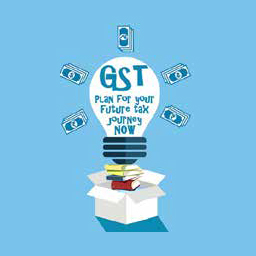Cost of book production skyrockets
A book’s various integral components like paper, printing and authors’ royalties (excluding the final product ie. book) are all under GST and this has added to the confusion among publishers.
It is legally wise to register with GST authorities. But if a publisher is registered, liability of service tax rests with the publisher.
The next thing is transportation cost and taxes that have to be paid on that count (for moving books from printer to publisher to distributor or an individual buyer). Transporters are all asking for GST registration from publishers. As are market place model distributors like Flipkart, Amazon and other online sellers.
What do all these different aspects mean for the individual publisher? Manas Saikia, Managing Director, Speaking Tiger, tells Book Link, ‘We should have been charged taxes. GST will benefit the whole nation in the long run except for the publishers as the input cost of making a book will be directly affected’.
What publishing experts are pointing out is, as tax is levied on associated activities, book production cost will inevitably increase. So, the so-called ‘exemption’ from tax for book as end product does not help publishers at all.
According to IPA, the International Publishers Association and the Federation of European Publishers Special Report on GST/VAT on books and e-books:
- The average VAT/GST rate applied to printed books is 5.75%.
- The average VAT/GST rate applied to e-books is 12.25%.
- 37 countries apply the same rate of VAT/GST to print and e-books.
- 35 countries apply a higher rate of VAT/GST to e-books than to print.
- Standard VAT rates in Asia (8.6%) are significantly lower than in Europe (21%).
www.internationalpublishers.org
Rather, if books were taxed under GST, as Saikia says it should have been, then publishers could file for returns on what they have spent on paper cost (as the vendor has already paid the tax) printing etc and affiliated processes. Exemption means, one cannot file for returns, even though the publisher spends more to get a book done.
For the publishing industry to understand the implications of GST and how it will increase publisher’s costs, Book Link asks Prerna Prakash, a tax consultant with the accountancy and audit firm VKG & Company to unplug the so-far mysterious GST.
Tax consultant Prerna Prakash answers Book Link Correspondent Radhika Tiwari’s questions to give us some clear answers on GST for the publishing industry.
Most of the Publishers are still not sure whether the industry has been entirely exempted from GST or is it on a 0 percent slab?
According to HS Code (Harmonized System Code), Chapter 49, Printed Books, Pamphlets, Booklets, Brochures, Leaflets and similarly printed matters like Dictionaries and Encyclopaedias, pictures, printed music, typescripts, plans are NIL Rated.
At the same time selling of space for advertisement in Print Media is in 5 percent Tax bracket.
Also exempt are unused postage, revenue or similar stamps of current or new issue in the country in which they have, or will have, a recognised face value; stamp impressed paper; banknotes; cheque forms; stock, share or bond certificates and similar documents of title (4907); Transfers (decalcomanias) (code 4908); printed or illustrated postcards; printed cards bearing personal greetings, messages or announcements, whether or not illustrated, with or without envelopes or trimmings (4909), Calendars of any kind, printed, including calendar blocks (4910).
Is it mandatory for Publishers to get themselves registered under GST? Do they need to upgrade their accounting software as well?
It is legally wise for everyone to sign up for a GST number according to the law. Section 22 provides for registration of every supplier effecting the taxable supplies. Registration of a business with the tax authorities implies obtaining a unique identification code (UIC) from the concerned tax authorities so that all the operations of, and data relating to the business, can be agglomerated and correlated. In any tax system, this is the most fundamental requirement for identification of the business for tax purposes, and for having any compliance verification mechanism.
A registration from the concerned tax authorities will confer among others the following advantages to the registrant:
- Legally recognised as a supplier of Goods and/or Services;
- Proper accounting of taxes paid on the input goods and/or services;
- Utilisation of input taxes for payment of GST due on supply of goods and/or services or both;
- Pass on the credit of the taxes paid on the goods and/or services supplied to purchasers or recipient. Notwithstanding anything discussed in the paragraph above, the following categories of persons shall get registered compulsorily under this Act:
- persons making any inter-State taxable supply;
- casual taxable persons making taxable supply;
- persons who are required to pay tax under reverse charge;
- persons who are required to pay tax under sub-section (5) of section 9 (electronic commerce operator)
- non-resident taxable persons making taxable supply;
- persons who are required to deduct tax under section 51 (Tax Deduction at Source);
- persons who supply goods or services or both on behalf of other registered taxable persons whether as an agent or otherwise;
- input service distributor;
- persons who supply goods and/or services, other than supplies specified under subsection (5) of section 9, through such electronic commerce operator who is required to collect tax at source under section 52,
- every electronic commerce operator;
- every person supplying online information and database access or retrieval services from a place outside India to a person in India, other than a registered taxable person;
- such other person or class of persons as may be notified by the Central Government or a State Government on the recommendations of the Council.
Therefore, it makes even the updating of accounting software compulsory.
Transporters of books are asking for GST Registration No, what should a publisher do?
As far as Law is concerned, Services Provided by Goods Transport Agency falls under Reverse charge--which means the services where tax is payable by the recipient (the publisher). Publishers will fall under one of this category:
Services Provided and agreed to be provided by a Goods Transport Agency (GTA) in respect of transportation of goods by road to: (a) Any factory registered under or governed by Factories Act , 1948
(b) Any Society registered under the Societies Registration Act , 1860
(c) Any co-operative Society established by or under any law
(d) Any Person registered under CGST/ SGST/UTGST Act
(e) Any Body Corporate
(f) Any Partnership Firm whether Registered or Not (this includes even small bookshops)
(g) Casual Taxable person Hence, If the Publishers are registered under CGST/SGST/UTGST Act, the liability to pay tax will rest with the Publishers.
Is book selling trading?
Book Making is not trading. Trading starts once the product becomes marketable.
Can publishers fall under the composite tax bracket?
Composite tax is for two or more supplies, one of which is a principal supply, and the second shall be treated as ‘a supply of such principal supply’. (A book is the principal supply. An e-book can be a supply within a supply.)
In many cases, the transactions that fall within the scope of GST may consist of more than one element. These elements may be a mix of goods, or services, or both. Sometimes these elements, if supplied separately , may have different GST liabilities depending upon the rates, applicability of time of supply or place of supply provisions. To avoid disputes about whether the supplier is making a single supply with one liability or multiple supply with different liabilities, it has to be determined whether the supply is one of goods, or of services, or it is a supply constituted of both goods and services (Composite Supplies/Mixed Supplies). In order to determine whether the supplies are ‘Composite Supplies’ or ‘Mixed Supplies’, one needs to determine whether the supplies are naturally bundled, or not naturally bundled, in the ordinary course of business.
For eg.
ABC Ltd manufacturers entered into a contract with XYZ Ltd. for supply of readymade shirts packed in designer boxes at XYZ Ltd’s outlet. Further ABC Ltd Manufacturers would also get them insured during the transit.
In this case , Supply of goods, packing materials, transport and insurance is a composite supply wherein Supply of Goods is the Principle Supply.
There is Another Scheme Called ‘Composite Scheme’ It is a Scheme for Small Tax Payers whose Aggregate Turnover does not exceed Rs 75 lakh. Under this Scheme, Tax is not collected from Recipient of Supply. There is no Input Tax credit Available. This Scheme is not applicable for Supply of goods through E-Commerce Operators.
Tax Rates:
Manufacturers other than notified Manufacturers - 1%.
Suppliers making Supplies referred to in clause (b) of paragraph 6 of Schedule - 2.5%. Any Other Supplier- 0.5%.
Coming to your question: Composite Scheme is not applicable for E-Commerce operators, hence it is not applicable in your case.





